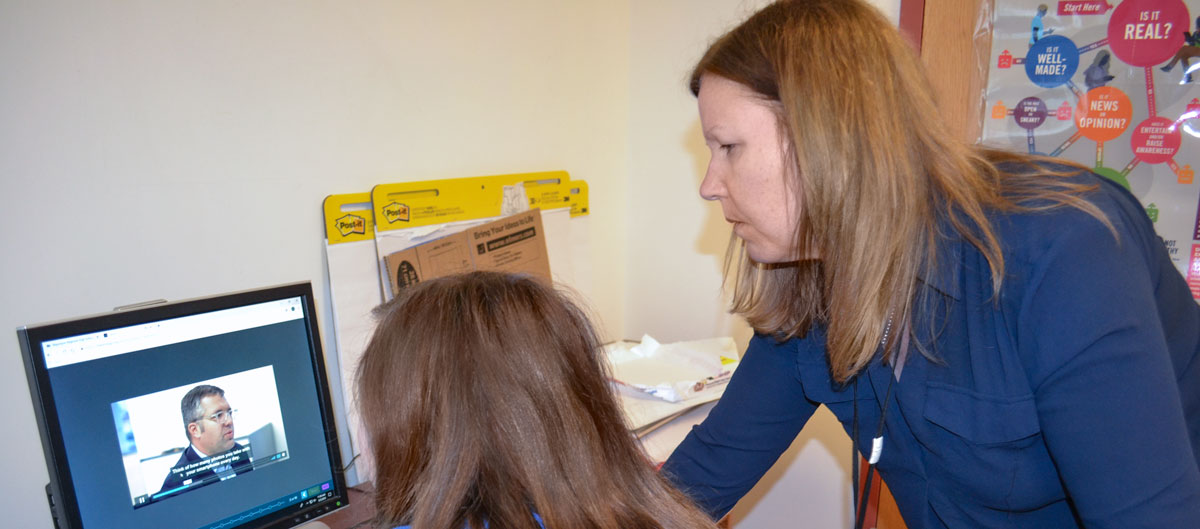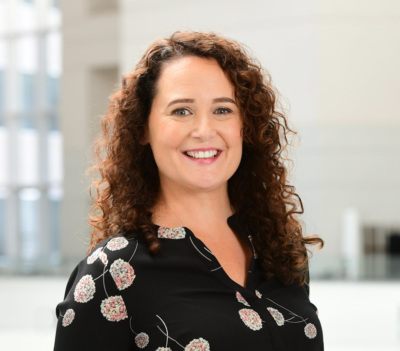
More Info
Computer Essentials teacher Catherine Griffin works with one of her 9th grade students using Checkology.
Apple Lin
Bringing news literacy to a school, one freshman class at a time
Like many teens asked to research a topic, Catherine Griffin’s students typically would open a search engine, type a word or phrase, and simply use the source at the top of their results.
But once Griffin guides them through the Checkology®virtual classroom, they start digging deeper, citing scholarly articles and database results in their research.
“I think students rush research sometimes, and Checkology just gets them to slow down and process information,” said Griffin, whose class, Computer Essentials, is required for ninth-graders and transfer students at Algonquin Regional High School.
The public school serves the Boston suburbs of Northborough and Southborough, Massachusetts, home to about 25,000 residents. This year, thanks to Griffin and two other educators, all 1,400 students at Algonquin will have completed Checkology’s lessons.
A fundamental skill
The school sees news literacy as a foundational skill and uses the platform as a precursor to an information literacy unit in which students produce a research paper.
“We’re very lucky,” Griffin said. “We’re all thrilled to have the backing of our superintendent, principal and parents who think this is an essential skill.”
She first heard about Checkology in 2016 from the chair of the school’s social studies department, who wanted to use it but couldn’t find time for it in her teachers’ packed curriculum of required lessons. As a certified social studies teacher, Griffin immediately grasped the benefit of news literacy education — and thanks to the greater flexibility afforded by her Computer Essentials course, she has been able to take her students through Checkology in its entirety over a period of three to four weeks.
“It’s an impact that I see right away,” she said. “They’re researching all the time. Questioning: ‘Who wrote it?’ ‘When was it published?’ ‘Who is this guy?’ ‘What is his profession?’ Whether they go to college or get a job, this is a skill they have to have.”
Customizing Checkology
Griffin has customized her approach to Checkology, kicking off the lessons by sharing the results of the 2016 Stanford History Education Group study (PDF) that found a lack of news literacy skills in teens and then having students watch Eli Pariser’s TED Talk on filter bubbles — the algorithmic bias that restricts what an individual user sees online. From there, she aims to complete all 13 lessons, blending in her own assignments along the way. She says the platform’s flexibility is one of its greatest assets.
“You can do it as a group, or we can have days when they are doing it on their own,” she said. “They can access it at home — anywhere they have a computer.”
Even when students are working independently in her classroom, Griffin said, she will see them talking to their neighbor or getting up and walking across the room to discuss a lesson or question with their friend.
“It’s so current, so it’s things they know or have heard of,” she said.
It also introduces them to journalism concepts and terms. “The vocabulary is huge for them,” she said. “Propaganda — knowing what it is. Bias. The word ‘provoke’ came up, and they weren’t sure what it meant.”
A Checkology ambassador
Griffin has become something of a news literacy ambassador in her home state. A couple of years ago, she and a colleague spoke at MassCUE, an annual statewide conference for “computer-using educators.” They led a breakout session on media literacy to a packed room; the bulk of their presentation was focused on Checkology, including a walk-through of the introductory lesson, “InfoZones.” It was, Griffin said, the most crowded session of the conference.
Afterward, she received about a dozen emails from educators wanting to know more. “There is a huge need for this among teachers,” she said.
Checkology has also changed how Griffin approaches information. Now, she said, when she does research, she goes through a checklist of different things to look for. She’s more thoughtful about the sources she consults. She’s more careful in verifying the information she brings to her classroom.
“We teach our students to read,” she said. “News literacy is the same thing. It’s reading and understanding. It is a necessity for these students who will be citizens and make decisions.”
